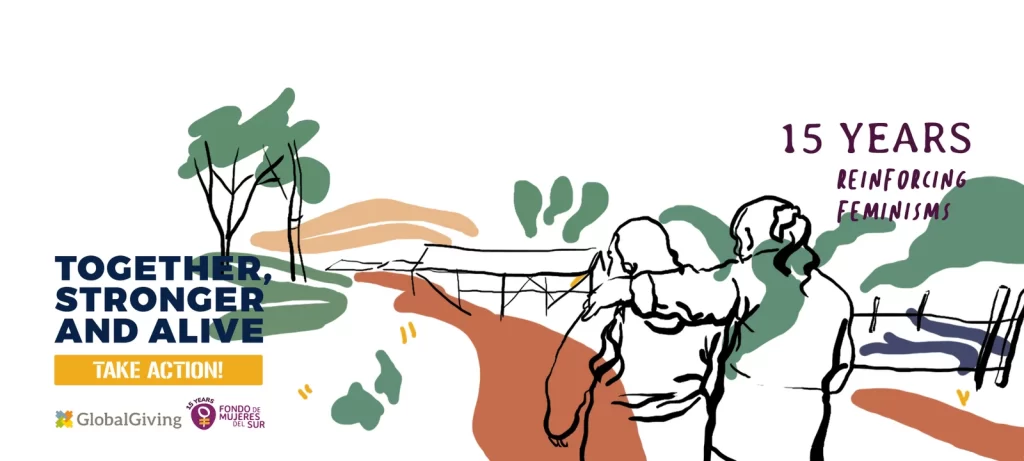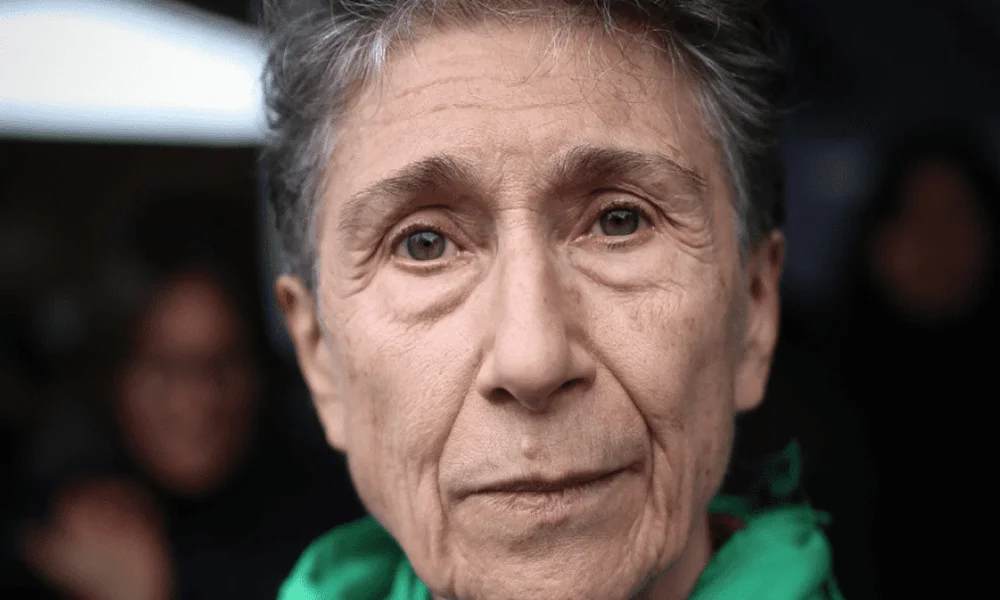Silvia Federici is a sociologist and philosopher, teacher and feminist activist. Fondo de Mujeres del Sur invited her to talk about the importance of popular feminisms and the power of the collective as a practice and political perspective. We were left with a remarkable reflection after sharing with Silvia as part of our 15th anniversary celebrations. You can watch the interview here or read the transcription below.
“First of all, I would like to thank you for the invitation to talk about popular feminisms and the construction of community networks, which has been the focus of my work for many years and which is also the topic so many colleagues in various parts of the world work on.
We have found political work and popular feminisms practices to be very inspiring, especially in Latin America. Feminisms that have been able to connect the struggle to increase the value of the activities that are most important for reproducing our lives every day, such as housework, care giving tasks, looking after the sick and, also, defending nature.
The fight against everything that is destructive, the different ways of destroying the land, the forests, the waters, which today is so important because we live in a time when capitalism is so wide spread across the world. It dominates, submits all aspects of our life to the logic of profit, to the logic of the market. And it is displacing, as we know very well, millions of people from their ancestral places.
It is destroying agriculture, that is more industrialised, that is always more up-to-date with poisons for fertilisers and pesticides, which destroy our body, our immunity. As we have seen with the COVID-19 epidemic, which is the latest of many epidemics, it tells us something – we live in a society that cannot guarantee our lives, we live in a society that kills us. Because COVID or different types of cancer are spoken about, and there is a continual destruction of nature, of the earth, of what produces our nutrition.
Also, the importance of popular feminisms is that they have revitalised ancestral practices, especially indigenous ones, that foster community relations. They promote a community organisation of social life. I often say that we have also seen in the United States an indigenisation of feminist politics. Because topics today that are typical in the South, such as the self-organisation of indigenous and peasant women, are also being appropriated in the North. Such as the understanding of how important it is to create and establish community networks.
For example, we have seen in so many peripheral areas of big South American cities (Buenos Aires, Brasilia and Mexico City), communities are being created around the collective work of people and populations, especially women expelled from the countryside who by pooling their efforts, they create new communities and new ways of collective reproduction. Like vegetable gardens, urban vegetable gardens, neighbourhood assembly meetings, community soup kitchens, which today are being established as a normal way of life.
All of this has made us reflect on the importance of constructing these commons, these new ways of communal, community relations, which are of strategic importance today in the struggle for a world beyond capitalist logic. A non-colonial world, a non-racist world, a world not built on the exploitation of human labour, on the accumulation of wealth in private hands.
What does the communal mean today? Well, as I have said, the struggles of popular feminisms have been and continue to be a continuous inspiration to this regard.
We have thought about what the communal is. Being able to think about it not only as wealth to share, as a social relationship, but rather as an organising principle for our lives on all levels. This is something that the practices of popular feminisms have given us. A way to think about the communal as a principle for organising our lives. A way to think about a life in which, at all levels, in any activity or relationship, we live collectively, we work collectively, we collectively share natural wealth, the wealth we produce, and we take responsibility for the lives of others.
This is a fundamental principle of the communal. Not thinking of our life in isolation, separated from others, individual. How has capitalist society been built with the nuclearisation of social reproduction? With the nuclearisation of families, family separations, love separations.
So, we can also think, for example, of the communal in terms of the production of knowledge. We’ve already had a lot of experiences because we have tried, we have learned from popular feminisms the importance of transmitting knowledge that accumulates from generation to generation.
For example, knowledge about seeds. We have seen in so many parts of the Caribbean, of Latin America, feminist collectives that establish seed banks, protect genetic wealth, so as not to be subjected to transgenic grains, which destroy crops and destroy our bodies. And the importance given in popular feminism to the recovery, to the reconstruction of collective memory. This insistence on connecting the present to the past, those who live with those who die. Our struggle is that of those who have fought and died in the past. This capacity that women have, the movements, that can see through the eyes and take on the voice of those who have died, of those who have fought, so that that voice is not silenced.
We can also think of the communal in terms of so-called “justice”. Today, justice, the way it is managed under capitalism, is above all punitive justice. It is a justice that is based on police and on prisons. Based on the communal we can think of a different way of applying justice and here we also include all the contributions from the experiences that many indigenous peoples have had with restorative justice, and that has been recovered in popular feminisms.
In the United States today there is a strong abolitionist movement, which has increased after the murder of many black youth, starting with George Floyd, but many others as well. That is how this movement was started, a movement that seeks to stop financing a police force that kills you, that always victimises those who are already victimised by the social and economic system. And that questions how we can think of justice that is not only based on prisons.
So, the communal, in recent years, based on the experience of popular feminist movements in Latin America, which bring together peasant women, indigenous women, urban women; that bring together the fight for territory with the fight for the body, the concept of body-territory; that say that land cannot be defended if a woman’s body cannot be defended; that the land cannot be defended if we continue to adopt a patriarchal world view; that women’s work, life, and subjectivity must be valued, that this is essential to defend the community itself, to defend the land itself.
We are learning all this and trying to elaborate on it from our position. It is something that has been fundamental for me, the conclusions we have reached while learning and reflecting on these experiences that come to us from the South. Seeing that these struggles are what allow us to become stronger, with more capacity for resistance, more capacity for resistance in this war, which capitalist society is waging: a war to further devalue our lives, to accumulate more social wealth and, above all, to extend the control of the great capitalist corporation over all natural resources.
So, if we have a future completely dominated by capitalist logic, it’s going to be a future in which the mining, oil, agricultural, green fuel companies are going to control all the natural resources. A future in which we cannot have direct access to nature, so we become completely dependent, for our lives, our body. So, there is a need to recover this control, which also includes the need to recover the power to make decisions collectively.
We believe that we have to build community networks, establish practices like those we see in popular feminisms. It is vital because, first of all, it allows thousands and thousands of people to survive. Faced with the crisis that has begun, a life crisis, for the majority of the world’s population, which is fundamentally a reproduction crisis. COVID has been a tremendous crisis, but the real crisis precedes COVID and continues after COVID, and it is a crisis of a system that not only does not reproduce our lives, but continues to take away, continues to steal everything that is necessary for us to reproduce ourselves.
In the communal, bringing together our strengths, collaborating, cooperating at work, sharing wealth is essential to survival. This means that a large part of the feminist struggle is also a struggle to recover the wealth that has been stolen, to recover the land, to regain control, access to natural wealth and social wealth.
Secondly, what is important about the communal is to create ways of reproductive work that, as I mentioned before, allow us to no longer be isolated, separated, privatised in our lives. The privatisation of life is as ugly, as destructive, as the privatisation of the land, of the earth. Because once we’re isolated from each other it’s easier to be defeated. So we have to come together in the reproduction of life, as is already being done in so many places.
I was talking before about community soup kitchens, places where assembly meetings are held, where decisions are made through an assembly, where collective activities are undertaken to provide afternoon tea for children, where ways are collectively built to share knowledge about herbs, natural remedies, medical knowledge, etc., to share and transmit.
All these activities are very important, because they allow us to come together and give us the ability to resist. At the same time, they create affective networks, so the reproduction of life is also the grounds for the construction of affectivity, one person trusting in the other, that strengthens our capacity for resistance.
So our communities are a resistance base from which we can negotiate with the authorities, no longer confront them in isolation, but with more strength. Because it is clear that today we are immersed in a capitalist world and that then we must negotiate, we must fight, we must get involved in conflicts. It is important to have the ability not to enter confrontation alone, but collectively, with the strength that comes from collectivising the way in which we reproduce ourselves, to say that we are not only going to come together for the protest, but rather every day, in daily life, this creates the infrastructure that strengthens our struggle.
On the other hand, the importance of experiencing the communal today, as it has been done in history, is the experience of how we can build an autonomous society, which is based on self-government. Because this is something that we have learned by reflecting on the struggles that popular feminisms are bringing up to date. Many of these feminisms come from a community life tradition, and that is why they already have an understanding of self-government. Therefore, if we are going to build another society we need an entire learning process on how we are going to govern ourselves.
Capitalism has expropriated so many things from us! It has expropriated our land, it has expropriated our knowledge, and it has given us commanded knowledge. It has expropriated the wealth that is produced, but, at the same time, it has expropriated our ability to decide about our lives, the ability to imagine a life in which we have forms of self-government.
The example we have is that of indigenous communities. A colleague that I think you know, Gladys Tzul, from Guatemala, has described for us in a very good, very important book, how in her community, the community of Totonicapán in the Guatemalan highlands, traditionally the forms of government are born from the reproduction of everyday life. There is no State that directs life. There is a community that has the ability to govern itself. But self-government, the rules that are followed, are rules that have been established for the practice of daily life, for the practice of community reproduction and to produce the wealth from which the community is nourished.
I believe that popular feminisms are providing examples of community practice, because they have experience building a society capable of self-government.
Finally, I think that by looking at the work that colleagues have done and are doing in the construction and creation of new forms of commons, from soup kitchens to assemblies or seed banks, we are beginning to achieve something.
These feminisms have allowed us to begin to experience in the present the society that we want to build. A society free from all this destructive logic, all this logic of death, which is the logic of capitalist society. They have made us understand that we should not wait for a future that seems like it will never come, but that we can, starting from the present, directly change this society in our lives. Thank you very much”.


